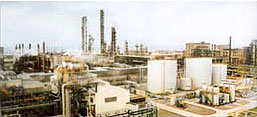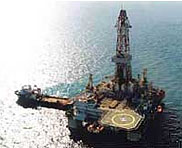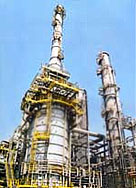Economy
After restoration of independence in 1991, the Republic of Azerbaijan began to realize its sovereign rights in economic field and to implement independent policy. The main directions of this policy are organization of the economic system based on different types of property, transition to market economy and integration into the global economy.
 Economically, the years after the independence can be divided into two main periods. The period of 1991-1995 was characterized by economic chaos and regression. The period after 1996 is known for an increase in macroeconomic stability and dynamic economic development.
Economically, the years after the independence can be divided into two main periods. The period of 1991-1995 was characterized by economic chaos and regression. The period after 1996 is known for an increase in macroeconomic stability and dynamic economic development.
As the result of far-sighted policy and intensive activities of the President of Azerbaijan, the national leader Heydar Aliyev, significant results were achieved in the fields of socio-economic development and integration into the global economic system within a short period of time – in spite of unfavorable initial conditions. The great achievement was that the Azerbaijani model of the state system establishment and development was established over the past period.
One of the main tasks of the country’s leadership in that period was efficient use and reallocation of the benefits from rich oil and gas endowment. In order to solve this task, in 1999 the national leader Heydar Aliyev adopted the Decree promoting cooperation with international companies in this field. Additionally, in order to channel the revenues from oil exports to the priority sectors of the economy and important social and economic projects, the State Oil Fund was established. At the current moment, international organizations evaluate positively Oil Fund’s activity and its provision of transparency.
 In the beginning of economic recovery, the country lacked oil exporting infrastructure. In order to fill this gap, in 1996 Azerbaijan signed an agreement allowed its oil exports via Baku-Novorossiysk pipeline. In 1999 the new pipeline Baku-Supsa was put into use; additionally, an agreement on construction of Baku-Tbilisi-Ceyhan, which is currently the major oil exporting pipeline.
In the beginning of economic recovery, the country lacked oil exporting infrastructure. In order to fill this gap, in 1996 Azerbaijan signed an agreement allowed its oil exports via Baku-Novorossiysk pipeline. In 1999 the new pipeline Baku-Supsa was put into use; additionally, an agreement on construction of Baku-Tbilisi-Ceyhan, which is currently the major oil exporting pipeline.
Oil-gas sector played dominant role in developing other sectors of economy. Considered economic policy led to macroeconomic stability and sustainable economic growth, as the result, reforms started in all economic fields, new measures are taken in order to improve social welfare of population.
Developing entrepreneurship, attracting domestic and foreign investment by establishing favorable business and investment environment, obtaining non-oil sectors’ development had been specific feature of implementing economic policy at this stage. As the result of fulfilling expedient measures, entrepreneurship section was formed and the role of private sector in social-economic development increased considerably.
 Implemented measures in providing diverse forms of property contributed positive effects to sustainable economic growth. However, despite at the beginning of privatization specific weight of private sector in GDP was less than 10%, currently special weight reached to 85%. Thus, implementing of Heydar Aliyev strategy overcame recession that appeared during the first years of independence and from 1995 in Azerbaijan new stage of development- recovery and dynamic development stage began. In 1995-2003 Gross Domestic Product increased 90.1%, revenues of government budget more than 3 times, international reserves 85 times, industrial production 25.2%, agricultural production 53.9%, foreign trade 4 times, average monthly real wages 5.6 times, inflation decreased to 2-3% and total capital investment amounted more than 20 billion USD.
Implemented measures in providing diverse forms of property contributed positive effects to sustainable economic growth. However, despite at the beginning of privatization specific weight of private sector in GDP was less than 10%, currently special weight reached to 85%. Thus, implementing of Heydar Aliyev strategy overcame recession that appeared during the first years of independence and from 1995 in Azerbaijan new stage of development- recovery and dynamic development stage began. In 1995-2003 Gross Domestic Product increased 90.1%, revenues of government budget more than 3 times, international reserves 85 times, industrial production 25.2%, agricultural production 53.9%, foreign trade 4 times, average monthly real wages 5.6 times, inflation decreased to 2-3% and total capital investment amounted more than 20 billion USD.
After maintaining independence as the major priorities of foreign economic policy, the Republic of Azerbaijan formed relationship with international finance-credit and economic institutions.
Azerbaijan had been admitted nearly to of all international institutions, including in 1992 IMF, World Bank, EBRD, Islam Development Bank, in 1999 Asian Development Bank. The main directions and specifications of social-economic policy strategy, which is continued successfully and improved by the President of the Republic of Azerbaijan, Ilham Aliyev, is to transit to market economy and to form social, diversified national economy, which possesses ability of self-development and to integrate to world economy.
 As the result of implementation of this policy, obtained successes are strengthened, macroeconomic stability was secured, diversification of the economy, development of non-oil sectors and regions accelerated, efficient usage of strategic international reserves was secured, the stability of national currency and confidence of banking system increased, conservative external debt strategy implemented, support from government to entrepreneurship intensified, social welfare of population improved sustainably.
As the result of implementation of this policy, obtained successes are strengthened, macroeconomic stability was secured, diversification of the economy, development of non-oil sectors and regions accelerated, efficient usage of strategic international reserves was secured, the stability of national currency and confidence of banking system increased, conservative external debt strategy implemented, support from government to entrepreneurship intensified, social welfare of population improved sustainably.
In order to implement comprehensive and sustainable measures aimed at economic diversification, the following President’s decrees and edicts were adopted and successfully implementing: the State Program of Socio-Economic Development of the Regions of Azerbaijan (2009-2013), the State Program of Poverty Reduction and Economic Development in the Republic of Azerbaijan (2008-2015).
In order to use existing economic potential of regions completely and efficiently, improve social-economic situation and provide of equilibrium development of the economy, state program that are implemented successfully describe attention of the President to economic development of regions, it caused complex development of regions, of which recovery and expanding infrastructures, creating new producing and processing enterprises, social-cultural institutions, opening new workplaces and improving social-welfare of population.
The new stage aims at increasing the competitiveness of the national economy, efficient integration into the world economic systems and ensuring a long-term dynamic socio-economic development in the country. Mr. Ilham Aliyev, the President of the Republic of Azerbaijan, has identified the tasks which are important for the achievement of this goal in his economic policy decrees. These particularly concern the strengthening and efficient utilization of the economic potential of Azerbaijan, including development of non-oil sector (formation of oil-independent national economy in Azerbaijan), entire and efficient utilization of the potential of each and every region in Azerbaijan, the establishment of favorable conditions for the opening of numerous workplaces, private business development, increasing the scope, quality and target groups of social services, the reduction of poverty, etc.
The President of the Republic of Azerbaijan Ilham Aliyev successfully and confidently continued and made it rapid and sustainable progress, development strategy determined and led to bright future of the citizens by national leader Heydar Aliyev, and made it rapid and sustainable progress.
Despite recession occurred in major developed economies during global financial-economic crisis, Azerbaijan preserved macroeconomic stability, economic growth, reduction of poverty, and increasing social and economic welfare of population. At the same time, taking the first place in economic growth among regional countries, Azerbaijan took upper stages for so-called indicator. However, in 2009 economic growth of GDP grew by 9.3% and growth per capita grew by 7.9% compared with 2008. Total GDP was formed by 64.1% by production sector and 28.3% by service sector; these sectors’ growth was respectively 10 and 9.1%.
Growth in oil-gas sector was 14.3%, moreover, in non-oil sector went up by 3.2%, industry – 12.8%, transportation – 9.3%, communications – 13.1%, trade – 9.9%.
Government feels specific priority to agriculture and as the result of comprehensive measures, value added in agriculture grew by 3.5% in comparison with 2008.
Finally, during 2004-2009 GDP in real value increased for 2.8 times, GDP in current prices amounted to 43 billion USD. GDP per capita rose from 2004 to 2009 more than 2.2 times and amounted 4874.1 USD. During this period real income of households increased 2.0 times, income per capita 85%, average monthly wages 3 times, minimum pension 3.8 times, minimum wages more than 6.3 times.
During 2004-2009 foreign trade increased 2.8 times, of which export 3.9 times, import 1.7 times, non-oil export 2.4 times. In 2009 both revenues and expenditures of government budget rose 7 times compared to 2004, during this period 32886 new enterprises were established, 840 thousands new jobs were created.
As the result of comprehensive measures, poverty was reduced for 4.1 times, as from 44.7% to 11% for the last 5 years.
The success of Azerbaijan was reflected in the reports of international organizations. Moreover, Azerbaijan is ranked 51 in the Global Competitiveness Report for 2009-2010, which is above other CIS countries. Furthermore, even in the current economic situation Standard&Poor’s increased the Azerbaijani rating’s forecast from “stable” to “positive”.
Dominant tasks of next stage will be sustaining of macroeconomic stability and economic growth. Within these purposes, provision of qualifying economic growth is priority. Aiming to these tasks, expanding of diversification of the economy, government wants to minimize dependence from oil sector, to transit to innovative economy, promote intensive production in agriculture, developing of economy in clusters. Moreover, comprehensive measure will go on in order to strength energy, food and ecological security.
Improving business environment, establishing economic areas and industrial zones, advice and information providing, strengthening government support to entrepreneurship and developing business relationship, development of entrepreneurship and regions will accelerate.
Increase of social and economic welfare of population remains the main direction and priority of social-economic policy for the coming years.





 top
top